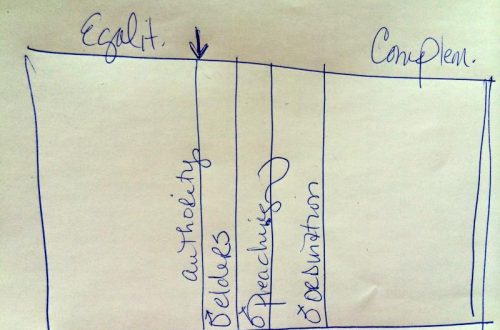Discomfort with Discomfort
A frazzled acquaintance mentioned that she had finally hired a new marketing manager. Her former manager had quit on short notice. The new manager would have to commute over forty miles in heavy traffic to make it to the office every day. I felt happy that she filled the position. But I cringed over the lengthy commute. Most people cannot sustain driving over three hours each day, five days per week. She chastised me for my expression, and then issued me a citation for “being negative.” Was I, though? Or was I just being realistic and empathetic towards the new hire? Good thing she didn’t see my facial expression when I got referred to an oncologist last year for surgery. It could have meant the guillotine for me.
I have had my fair share of long work commutes. A long commute would weary most people. I figured (to myself) this new hire wouldn’t last long. She didn’t. Does that make me a negative person? Or a logical person? Did my “negative vibe” enter the new hire’s brain via osmosis to make her aware of a grueling commute that she failed to previously notice? Surely the hiring party, though desperate to fill the position, had acknowledged the commute time somewhere in the recesses of her mind, before quickly pushing back at herself for thinking negatively. Did she believe she could will away the new hire tiring of a laborious commute just by thinking positive thoughts? That’s some voodoo right there.
Why do we shut people down when they express honest opinions? Or worse, their fears and struggles? Why does society expect me to put a positive spin on things that aren’t inherently positive? Like pandemics. Do we feel uncomfortable with the truth? Bothered by discomfort and distress? Maybe a bit of both?
Is this a safe place to admit that all this positivity positively drives me nuts? Or is that just too negative? I view this false positivity as a form of dishonesty that stifles freedom of expression. Can we exhibit Christ-like love while shushing those who express grief or anxiety? Or even curiosity? This judgment and condemnation for my honest human vulnerabilities wear on me. Who invented this Lala Land of Uber Positivity anyway? I need to speak with her. It’s a “her.” I can’t prove that. But I have a suspicion. Hint: I’ve never witnessed a man dogging others for the crime of negativity.
Some may believe it’s healthy to avoid negative thinking and negative expressions. But the experts would disagree. A 2020 review of domestic violence studies found that positive bias and false optimism increased the risk of people staying with their abusers. Yikes. Shortcutting people’s rights to express grief can compound their grief. It can shame a person who feels pressured to wear a false smile, causing further isolation instead of seeking support or mental health care.
Not to suggest we should gush out negativity. No one enjoys the company of a Negative Nancy (no offense to all the wonderful women named Nancy.) But how can one speak the truth in love when one cannot speak the truth?
Of course, positivity can improve mental health. But mental health experts say social support and adaptive coping abilities must accompany a positive outlook for positive thinking to work. The bottom line: positivity will not sustain itself on an island. Disclaimer: having a positive outlook does not equal toxic positivity. Although a positive attitude has mental health benefits, toxic positivity is different. It demands positivity in the face of struggle, hardship, and common sense. As my psychotherapist husband says, “The body keeps the score.” Reality has a way of catching up with us.
By the way, research shows that expressing negative emotions may help the brain process feelings. Vocalizing our struggles can help remove the power these feelings hold over us. It’s working for me as I type this post.
No honest person thinks positively all the time. In a fallen world we will experience negative emotions. Do we believe that the One who turned over tables in the temple, wept, and sweat blood, ran from negative emotions? Jesus did not quip back with pithy positive responses when others shared their hardships with him. If we are to minister to others, we need to get comfortable with the discomfort of others. Or maybe first our own.




